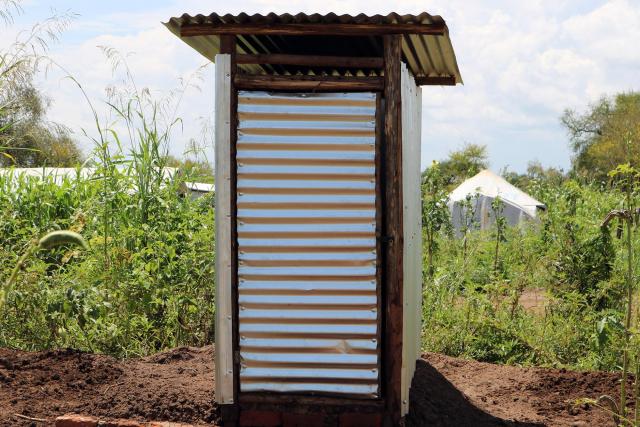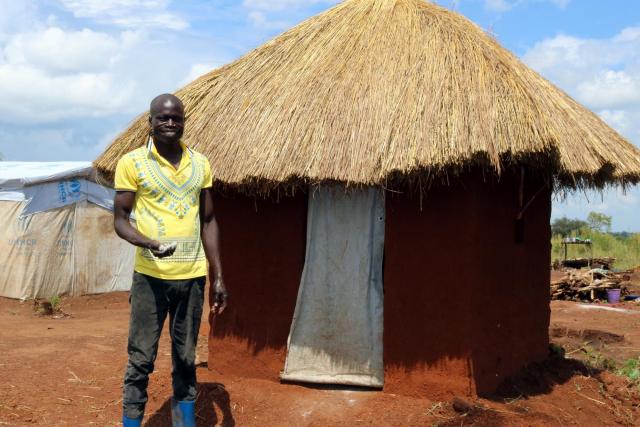Combating open defecation in Palorinya settlement

Moyo district - To answer nature's call, Charles Tabu, a South Sudanese refugee in Palorinya settlement would walk metres from his house to an open space. It's there that he would dig in to the ground, defecate and cover the fecal matter with soil. This had become a "norm" for Tabu and his family before he constructed his household latrine.
“Defecating in the open was embarrassing, we had no privacy as the land here is clear of shrubs,” Tabu narrates. “The wind and rains would blow and erode the soil and dry fecal matter to our homes which made our lives prone to diseases.” Tabu recalls this happening from December 2016 to the first quarter of 2017 when majority of South Sudanese refugees were arriving at Palorinya.
On their arrival, refugees had to use the few available emergency communal lavatories established by the Lutheran World Federation (LWF). Despite their existence, thousands of people chose open defecation over them due to the queues and long distances to the facilities.

Open defecation triggered diseases
“A sharp stench and houseflies filled the settlement, and it’s that rotten stench that became the air we breathed,” Wori Laisanda Wani “It made us sick, people especially children always complained about stomach-aches.”
Scarcity of medicines and the long distances to the health centre made the situation even worse as Wani explains that many of those who fell sick remained without treatment for days. “My child was infected with severe typhoid, he constantly vomited and passed out a watery stool which dehydrated and left him dizzy for weeks,” said Tabu.
Tabu recalls living in fear and experiencing sleepless nights whenever his children fell sick. “I couldn’t sleep because I had to watch over them during the nights.” Even during medication, Tabu says his children and other sick people continued living in a dirty environment that made them prone to the same and more diseases. "We feared for a cholera outbreak and other diseases like; typhoid, dysentery and diarrhoea."

Millions of Ugandans living without household latrines
Open defecation remains a major health problem in almost all settlements during the emergency phase as explained by Shyne Nyamatte an IOM project Officer with LWF. She continues to say that the vice remains a national and global health concern.
In Uganda alone, national population and housing census figures released by the Uganda Bureau of Statistics (UBOS) recently, show that 8% of the population stays in households with no toilet facilities. The 8% represents 2.7m Ugandans out of the 34.6m people in the country.
Out of 183,734 people in Palorinya, 18,199 have household latrines, the rest remain without the facilities hence open defecation. Other reasons ascribed to the vice include; cultural perceptions, long distances to communal latrines and lack of construction materials.

Refugees receive latrine digging and construction materials
To avert open defecation and its effects, LWF in partnership with the International Organization for Migration (IOM) provides latrine construction materials to refugees in Palorinya settlement as a way of influencing household latrine construction.
“We provide a construction kit to each household that includes; a plastic slab with a drop hole cover, construction, treated poles and a hand washing tap,” said Nyamate. “Each group of five households is also given a latrine digging kit that includes; a pick axe, a hoe, a metallic bucket, a rope, wheel barrow and a spade.”
Tabu says that he constructed his household latrine as soon as he received the construction and digging kit. “My family now owns a clean latrine and tippy tap for hand washing, I don’t have to worry about my children getting infected with diseases.” “I never worry about my children catching urinary tract infections from communal latrines because we have a household one that we keep clean and is used by only family members,” added Gladys Juan.

Free modest latrines for refugees with special needs
For those with special needs like the elderly, those with physical disabilities and chronic diseases, free modest latrines are constructed for them in their homes. Nyamatte explains that such people lack the capacity to build their own latrines which may result in to open defecation.
With these efforts, households with latrines have increased from 1.9% in January, 2017 to over 32% as of September, 2017 hence improving sanitation and hygiene in the settlement.
LWF appreciates IOM’s support towards its humanitarian activities aimed at improving sanitation and hygiene among the people of Palorinya settlement.

